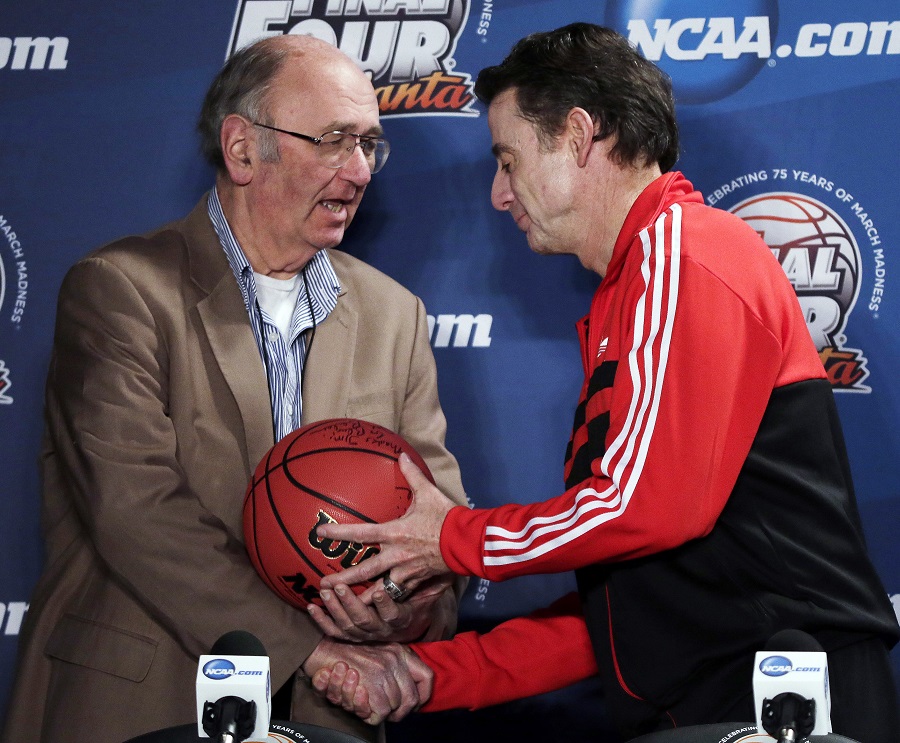By BARRY WILNER and PAUL MONTELLA, The Associated Press

NEW YORK (AP) — Jim O’Connell, the longtime college basketball writer for The Associated Press and a member of the Hall of Fame, has died. He was 64.
He died Monday after a series of ailments, his son Andrew said.
Known to nearly everyone as Oc, O’Connell was a former president of the United States Basketball Writers Association. He entered that organization’s Hall of Fame in 2002, the same year he earned the Naismith Memorial Hall of Fame’s Curt Gowdy Award for his coverage of the sport.
O’Connell served as the AP’s national college basketball writer since 1987 and was a fixture at all the sport’s major events, from the Final Four to the Big East Tournament to the Maui Invitational. He covered eight Olympics and worked as a desk supervisor, overseeing the entire sports operation for the world’s largest news-gathering organization.
The press table at a college basketball game was Oc’s stage. Thanks to his Irish wit, long memory, easygoing personality and perfect timing, he always had an eager audience of TV analysts, other writers, fans and coaches.
“He was the source on college basketball,” said Terry Taylor, the AP’s sports editor from 1992-2013. “He knew coaches, players, games, dates of games and final scores — all manner of factoids — off the top of his head. And when you looked it up, he was always right.”
He was a mentor to journalists in the AP and elsewhere. For decades, he coached young reporters in bureaus around the AP on how to cover a game, making sure the play-by-play, the NCAA Tournament implications and the star performances were all put into context.
O’Connell built deep relationships with colleagues, players, executives, referees and coaches, particularly the ones who most respected him, such as fellow Hall of Famers Jim Calhoun, Jim Boeheim and Mike Krzyzewski.
“He was a great man, he really was,” Boeheim said. “He was a guy you looked forward to seeing. Always had a good word and a smile. He wrote sports, but he did it in a positive way, always. He was always good to players, coaches, fans — everybody. He was a unique individual, always had a good word for everybody. Always.”
A stick boy for the New York Islanders as a teen, O’Connell went to St. John’s and joined the AP’s first class of baseball dictationists in the mid-70s, a part-time job he soon converted into a career covering hoops. After leaving to become sports information director at Fordham — where he met his wife, Anne Gregory, the best female basketball player in school history — Oc returned to the AP in 1978.
By 1979, he was aiding the AP’s coverage of the Final Four. He had a long chat about basketball with Indiana State star Larry Bird, who was famously reticent about speaking with the media. It was only when O’Connell pulled out a notepad that Bird clammed up.
He covered every Final Four from 1979 through 2017, including 2015, just months after an operation that required partial amputation of his leg. The NCAA made sure O’Connell had a seat at the end of the media table, so he could stretch out his prosthetic.
O’Connell was just as knowledgeable about teams like Rider and Wagner as he was about powerhouse programs like Duke and Kentucky. If a fan asked him about any team, he could tell them what he thought of their chances. For decades, if there was a college basketball game in the New York area, Oc would probably be courtside — whether he was working or not.
“Oc and his wife, Annie, were great friends to my wife, Patty, and me when we moved to Long Island to take the job at Hofstra,” said Jay Wright, coach of current NCAA champion Villanova. “Oc is the most knowledgeable, ethical, humble college basketball expert ever. He is dependable as a friend and as writer.”
For those in the AP, especially working a long night shift in New York editing game stories, or those on the phone asking for his help covering a game thousands of miles away, a conversation with Oc would be the highlight of the week.
“Perhaps most importantly, he was beloved by his AP Sports colleagues,” Taylor said. “He told funny stories like no one else, and he always had one. He lit up the room when he walked in for his night shift.
“It was always a treat to work with Oc,” she said. “He was smart. He was calm. And he was excellent at cracking me up at just the right moment to relieve tension.”



